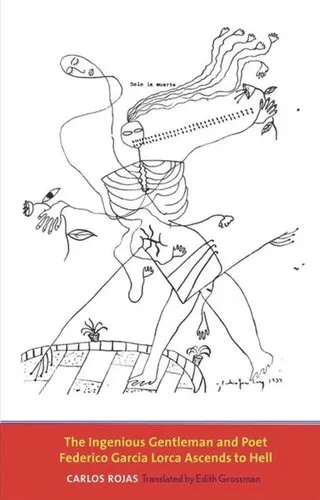Don Quixote
3.9
بر اساس نظر کاربران

شما میتونید سوالاتتون در باره کتاب رو از هوش مصنوعیش بعد از ورود بپرسید
هر دانلود یا پرسش از هوش مصنوعی 2 امتیاز لازم دارد، برای بدست آوردن امتیاز رایگان، به صفحه ی راهنمای امتیازات سر بزنید و یک سری کار ارزشمند انجام بدینکتاب های مرتبط:
معرفی کتاب 'دون کیشوت'
کتاب 'دون کیشوت' اثر برجسته 'Miguel de Cervantes' یکی از مهمترین آثار ادبی تمام دورانها به شمار میرود. این اثر که به عنوان نخستین رمان مدرن در تاریخ ادبیات شناخته میشود، داستان شوالیهای به نام دون کیشوت را روایت میکند که در جستجوی ماجراجوییها و اعمال شجاعانه سفر میکند.
خلاصهای از کتاب
در کتاب 'دون کیشوت'، شخصیت اصلی که یک نجیبزادهای از لا مانچا است، دچار جنون میشود و خود را به عنوان یک شوالیه میپندارد. او با نام شوالیه 'دون کیشوت' و همراهی رعیتی سادهدل به نام سانچو پانزا، ماجراجوییهایی را آغاز میکند. دون کیشوت با تصور اینکه باید با دشمنان و ظلم مبارزه کند، در برابر آسیابهای بادی میایستد و آنها را به چشم اژدها میبیند. این داستان در دو بخش نوشته شده است و نشاندهنده نبرد بین واقعیت و خیالپردازی است.
نکات کلیدی
- بررسی طبیعت انسانی و تمایلاتش برای تحقق رویاها و تخیلات
- تضاد بین واقعیت و خیال در زندگی
- نقش و تاثیر ادبیات و داستانهای شوالیهگری بر ذهن و رفتار افراد
- طنز و انتقاد از ارزشهای اجتماعی و باورهای فرهنگی زمانه
جملات معروف از کتاب
«بگذار دیگران hito بگويند چه میخواهند، اما فرد بايد به آنچه قلبش میگويد گوش فرا دهد.»
«حقیقت درستی است که نمیتوان آن را نادیده گرفت.»
چرا این کتاب مهم است
کتاب 'دون کیشوت' به دلیل تاثیری که بر توسعه رماننویسی مدرن گذاشت از اهمیت زیادی برخوردار است. تاثیری که این اثر بر ادبیات، فرهنگ و هنر داشته است در طول قرون بیشماری احساس شده و هنرمندان و نویسندگان زیادی از آن الهام گرفتهاند. این کتاب به بررسی عمیق روان انسانها پرداخته و به مخاطب این امکان را میدهد تا از دریچه چشمان شخصیتهایی همچون دون کیشوت و سانچو پانزا به قدرت تخیل و تلاش برای هیچواندیشی نگاه کند.
در دنیای امروز که تعاملات اجتماعی و اقتصادی با سرعت بالا در حال تغییر است، این داستان همچنان موضوعات جاودانی همچون جستجوی هویت، معنا و مفهوم را مورد بررسی قرار میدهد. 'دون کیشوت' الگویی است برای همگان که خود را در موقعیتهای سخت پیدا کنند و به آنان یادآوری کنند که تسلیم خیالپردازیهای خود نشوند و در راه دستیابی به ارزشها و آرمانهای خویش تلاش کنند.
Introduction to 'Don Quixote'
Written by Miguel de Cervantes, 'Don Quixote' is a landmark in Western literature, a timeless saga that delves into the grandeur of dreams and the harshness of reality. Initially published in two volumes, in 1605 and 1615, 'Don Quixote de la Mancha' has captivated readers with its captivating narrative and profound insight into the human condition.
Detailed Summary
The story begins in a small village in La Mancha, Spain, where an aging nobleman named Alonso Quixano becomes so enthralled by the chivalric romances that he read he impulsively decides to become a knight-errant. Donning a suit of armor and assuming the romanticized name Don Quixote, he embarks on a quest for adventure alongside his loyal squire, Sancho Panza.
The first part of the novel follows Don Quixote's misguided and often comic adventures. Mistaking inns for castles and windmills for giants, he creates a world fueled by imagination, far removed from reality. His exploits serve as both a parody of and homage to the chivalric traditions and medieval literature that influenced him.
In the second volume, published a decade later, Cervantes provides deeper introspection into the characters. Don Quixote faces challenges not only from the physical world but also from the very readers his tales entertain. The meta-literary approach used in this volume highlights the blurred lines between reality and fiction.
The narrative invigorates a myriad of themes, from the nature of sanity and madness to the social hierarchy and the power of literature.
Key Takeaways
- The Power of Imagination: Don Quixote's adventures underscore the boundless power of imagination and its impact on one's perception of reality.
- Reality vs. Perception: The novel provides a dual perspective on adventure and heroism, blurring the lines between reality and fantasy.
- Satire and Irony: Cervantes masterfully uses satire to critique the romantic ideals of his time, shedding light on societal norms and human nature.
- The Complexity of Character: Through the juxtaposition of Don Quixote and Sancho Panza, readers explore themes of loyalty, friendship, and the contrast of idealism and pragmatism.
Famous Quotes from the Book
"The truth may be stretched thin, but it never breaks, and it always surfaces above lies, as oil floats on water."
"When life itself seems lunatic, who knows where madness lies?"
"There is no book so bad... that it does not have something good in it."
Why This Book Matters
'Don Quixote' stands as a monumental piece of literature because it transcends its own time, offering insights that remain relevant today. It is not only a critique of the literary and social traditions of the 17th century but also a profound exploration of the human spirit's resilience in the face of reality.
At its core, the story of Don Quixote teaches us about the beauty of pursuing dreams, the value of friendship, and the inevitable confrontation with reality. Cervantes created not just a character but a symbol of timeless human folly and greatness. His work laid the foundation for modern novelistic narratives and continues to influence writers and thinkers across cultures.
Ultimately, 'Don Quixote' remains a testament to the enduring nature of literature and the complexities of human nature, bridging the gap between comedy and tragedy with unparalleled depth.
دانلود رایگان مستقیم
برای دانلود رایگان این کتاب و هزاران کتاب دیگه همین حالا عضو بشین
برای خواندن این کتاب باید نرم افزار PDF Reader را دانلود کنید Foxit Reader



